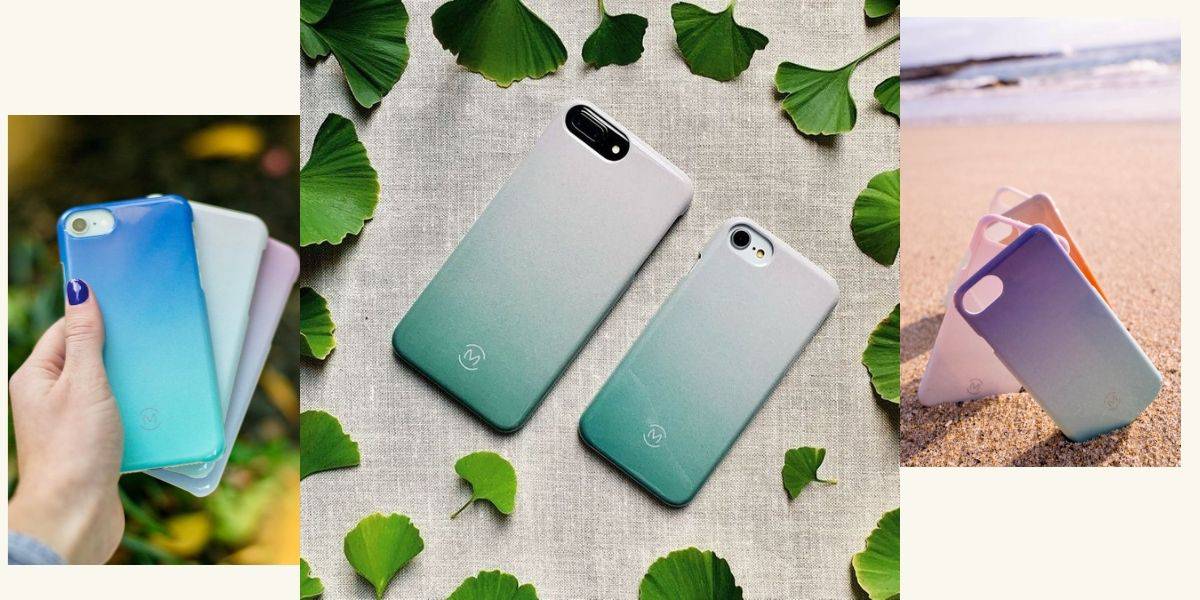The best part of being a sustainable living blogger is (virtually) meeting entrepreneurs all over the world who are figuring out how to make products and services that are useful and sustainable. Emily Wan, the founder of Movement, is one of those entrepreneurs. I sent her a few questions about her recycled phone cases and the inspiration behind the company she founded, and her answers were so inspiring we decided to turn it into an article about sustainable innovation. The future of sustainable innovation will be created by people like Emily who believe businesses should solve problems not only for people but also for the planet.

Movement is a direct-to-consumer tech accessories maker helping consumers shop and live more sustainably. Their recycled phone cases are made from either 100% recyclable or 100% repurposed materials. Movement’s phone case recycling program is open to both customers and the general public.
Below is my Q&A with Emily. The questions are mine, the answers are hers.
What inspired you to start a company focused on sustainability and circular economy?
Many different things contributed to the inspiration but a quote I kept seeing on social media sums it up pretty well, “Stop buying trash and companies will stop making trash.”
It’s without question people and the planet deserve so much better than being sold trash! When it became clear a significant part of the responsibility actually belongs to product makers, we felt it was time to do something new and do it better.
Why is recycling non-customers phone cases part of your business?
There are a couple of reasons why we accept old cases from the general public:
Plastic pollution is a global health crisis that requires all hands on deck. Product makers are part of the problem so our responsibility must be extended to all stages of a product’s life cycle.
Unlike redirecting a customer to a separate company like Terracycle and creating an extra step in the process, we accept the cases directly and eliminate the outsourcing cost. That enables us to open the program to the general public.
For those who might wonder why can’t they just send their cases directly to the recycler, private recycling is usually a B2B service dictated by efficiency and value. So most recyclers only accept bulk post-industrial material because the less varied the source, the easier it is to process. Movement’s partner is also private but they pioneered durable plastics recovery and have the technology to process less pure material, i.e. from post-consumer sources. Still, they also only accept in bulk and this is the first time they agreed to handle post-consumer material because they believe in our mission. It’s all the more reason for us to make Movement’s recycling program available to as many people as we can reach!
Phone cases are generally made from durable plastics that are not accepted by municipal recycling programs. Our partner has the proprietary technology to sort, clean, and reformulate the recycled plastics into pellets. Their clients include Fortune 500 companies who will use these pellets in large scale production of optic fibers, computer monitors, coffee makers, and even phone cases.
How would you define sustainable entrepreneurship?
Sustainable entrepreneurship is to create value from business practices that invest in Nature. In other words, it’s to set a successful example of doing business that’s better for both people and our planet.
How can other entrepreneurs promote sustainability?
First, by helping consumers understand people’s biggest impact on Nature is what we buy. That was not widely considered by industries before and now we are here to change that. Second, by making shopping and living sustainably easier for consumers. Consumers should be expected to make minimal to no behavioral change because that’s the biggest deciding factor of the success of any sustainability initiative. They should be able to rely on businesses to figure out how to minimize their environmental impact and the effort needed to adopt a sustainable lifestyle.
What do you think the future of sustainable innovation will look like?
The future of sustainable innovation will very much depend on the private sector. The focus will be on areas I like to call “back to the basics” such as energy, infrastructure, and agriculture/food production. That’s what I very much hope to see because societies depend on these basic factors to thrive, but we won’t thrive unless we ensure Nature does too.
Who (or which company) has inspired you as an entrepreneur?
I’m endlessly inspired by Nature both as an entrepreneur and as a person in general. Can anything else so perfectly epitomize resilience, harmony, and beauty? I agree when people say entrepreneurship, especially a startup, tends to begin with a problem needing a solution. For Movement it was, “Nature creates no waste. Why should we?” I really believe if we could just humble ourselves for a moment and look to Nature for solutions, we’d find all the answers we’d ever need.
Do you think being a woman has impacted your view on sustainability or social consciousness?
I absolutely believe being a woman makes me more conscious and conscientious because we tend to observe a wider view and recognize the connectedness of basically everything. To me, it is no coincidence that women are dominating the green blogosphere!
